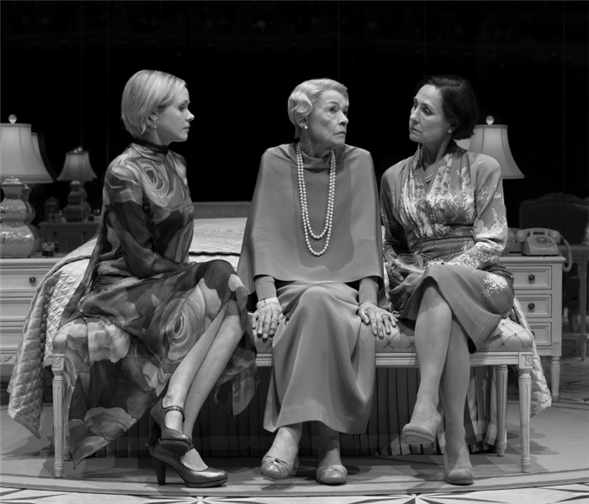Translate Page

Tony nominee Alison Pill on the prescience of Edward Albee's 27-year-old play
---
Edward Albee's Three Tall Women was clearly not written in the digital era. A lawyer makes a house call that would now be done by Skype; bills are settled by mail, not online; and the only hint of a cell phone came when one trilled in the audience (seriously, turn those things off). Yet the play feels incredibly current.
"It's wonderful to be telling women's stories -- and especially older women's stories -- at this moment, because it's still quite revolutionary," says Alison Pill, who stars alongside Tony winner Laurie Metcalf and, returning to Broadway after 30 years, four-time Tony nominee Glenda Jackson. "It's very cool that we're on Broadway with a story about three women, and the lead in the play is over 80. It's incredibly uncommon. And the fact that we are putting butts in seats, I think, points to this gap in people's knowledge -- not their desire to see these shows, but that they don't know that they want to see these shows."
Three Tall Women's original New York production ran for over a year Off-Broadway in the mid-'90s, but the play's Main Stem debut clicks into the #MeToo era like a puzzle piece. Act One concerns a cranky 92-year-old (Jackson), her put-upon fiftysomething caretaker (Metcalf), and an ice-cool 26-year-old lawyer (Pill) who's arrived to resolve some issues with the nonagenarian's estate. In Act Two, all three (named A, B, and C in the script) are revealed as the same woman at different points in her life: a hopeful debutante, a middle-aged cynic, and an isolated elder in decline. For the entire evening, a woman who was always expected to be silent -- stifling her sadness, fear, betrayal, lust, and loneliness -- is able to be heard on all counts, and in triplicate.
Not that she's a long-suffering saint. Quite the opposite. "These are not easy women to get along with," admits Pill, a stage veteran who was nominated for a Tony for The Lieutenant of Inishmore. "They're all difficult. They all think they're all right all the time. And I can definitely relate to that."
The 1991 play marked a resurrection for Albee, who electrified the theatre world in the '60s with The Zoo Story, A Delicate Balance, and Who's Afraid of Virginia Woolf?. A fallow period followed in the '70s and '80s, compounded by a drinking problem and Albee's refusal to write commercial (or even audience-friendly) material. So alienated was Albee that he premiered Three Tall Women in Vienna, calling Broadway "our national disgrace."
But when Three Tall Women debuted Off-Broadway, it thrilled critics and netted Albee the 1994 Pulitzer Prize for Drama, ushering him back onto the New York scene.
In interviews then, Albee said he wrote the play to process his mother's death. The two had been estranged for decades, and they reunited briefly -- though not warmly -- before she died. Those circumstances are reflected in Three Tall Women. Although the character of The Boy never speaks, he is spoken of. "Albee writes about his own part in it -- what an impossible human he was too," explains Pill. "These women were so easily put into a box, and it's not fair. Yes, she's a horrible person. But she's also many other things."
Albee described writing the play as "a kind of exorcism," and at points it plays like one. In Act Two, each woman gets a cathartic monologue. Pill's is perhaps the most heartrending. As C learns from A and B what her future has in store, she begs someone -- the older women, or God -- to assure her that her "best times haven't happened yet."
The play's three disparate vantage points on life are what make it so universal. It's one specific woman's story, yes, but it's also our collective journey, regardless of age or gender. "A couple of young women on the edge of turning 26 came to see it, and they related to my speeches," says Pill. "But my husband, who is now in his forties, looks at Laurie's speech at the end about having a 360-degree view of the world. We all age, we all die, we all lose family and friends. We watch that happen to our parents. Anybody who is a human will have something to say about this show."
---
Follow Michael Martin at @martinized. Follow TDF at @TDFNYC.
Top image: Alison Pill, Glenda Jackson, and Laurie Metcalf in Three Tall Women. Photos by Brigitte Lacombe.
TDF MEMBERS: Go here to browse our latest discounts for dance, theatre, and concerts.